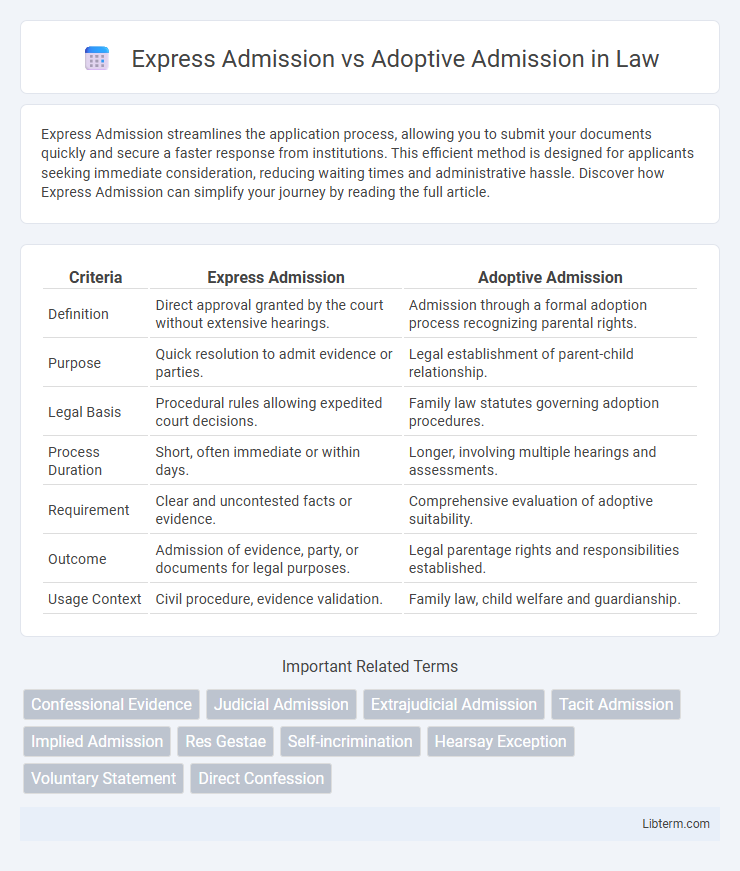Express Admission streamlines the application process, allowing you to submit your documents quickly and secure a faster response from institutions. This efficient method is designed for applicants seeking immediate consideration, reducing waiting times and administrative hassle. Discover how Express Admission can simplify your journey by reading the full article.
Table of Comparison
| Criteria | Express Admission | Adoptive Admission |
|---|---|---|
| Definition | Direct approval granted by the court without extensive hearings. | Admission through a formal adoption process recognizing parental rights. |
| Purpose | Quick resolution to admit evidence or parties. | Legal establishment of parent-child relationship. |
| Legal Basis | Procedural rules allowing expedited court decisions. | Family law statutes governing adoption procedures. |
| Process Duration | Short, often immediate or within days. | Longer, involving multiple hearings and assessments. |
| Requirement | Clear and uncontested facts or evidence. | Comprehensive evaluation of adoptive suitability. |
| Outcome | Admission of evidence, party, or documents for legal purposes. | Legal parentage rights and responsibilities established. |
| Usage Context | Civil procedure, evidence validation. | Family law, child welfare and guardianship. |
Introduction to Hospital Admissions
Hospital admissions streamline patient care by categorizing intake processes into Express Admission and Adoptive Admission. Express Admission emphasizes rapid registration and minimal paperwork, ideal for urgent or routine cases requiring swift medical attention. Adoptive Admission involves a comprehensive evaluation and detailed patient history, ensuring personalized care for complex or prolonged treatments.
Defining Express Admission
Express Admission is a streamlined process that allows certain applicants, often international students, to gain quicker entry into a country or educational institution by meeting specific eligibility criteria such as academic excellence or program-specific requirements. It contrasts with Adoptive Admission, which typically involves more comprehensive evaluations and longer processing times to accommodate varied individual circumstances. The key advantage of Express Admission lies in its efficiency and reduced waiting periods for qualifying candidates.
Understanding Adoptive Admission
Adoptive Admission allows non-parents, such as guardians or relatives, to obtain legal custody or guardianship of a child, ensuring their rights and responsibilities are formally recognized by the court. This process typically requires a more comprehensive review of the applicant's background, living conditions, and the child's best interests compared to Express Admission, which offers expedited entry mainly for parents with minimal validation. Understanding Adoptive Admission is crucial for navigating the legal requirements, including home studies and consent from biological parents, to secure stable and lawful care for the child.
Key Differences Between Express and Adoptive Admission
Express Admission enables immediate entry based on pre-approved criteria, streamlining the application process and reducing wait times. Adoptive Admission requires a detailed evaluation, including personal and family background assessment, leading to a longer processing period. The key differences lie in the speed of approval, documentation requirements, and the level of scrutiny applied during the admission process.
Criteria for Express Admission
Express Admission requires applicants to meet specific eligibility criteria such as minimum age, educational qualifications, and work experience thresholds to qualify for accelerated processing. Candidates must submit verified documents proving their credentials and demonstrate proficiency in required language skills. This streamlined process prioritizes individuals with in-demand skills or qualifications that align with the program's labor market needs.
Criteria for Adoptive Admission
Adoptive Admission requires meeting specific criteria, including the completion of a legal adoption process and verification of the adoptive parent's eligibility based on residency, income, and family background checks. Unlike Express Admission, which often relies on streamlined documentation and expedited processing, Adoptive Admission mandates detailed assessments to ensure the child's best interests and stability in the adoptive home. Eligibility criteria may also include home studies, background clearances, and proof of the adoptive parent's capability to provide a safe and supportive environment.
Advantages of Express Admission
Express Admission offers significant advantages by streamlining the enrollment process, allowing students to secure their place quickly without extensive paperwork or prolonged waiting periods. This expedited approach enhances convenience for applicants and institutions by minimizing administrative burden and accelerating decision timelines. The efficiency of Express Admission benefits international students seeking timely confirmation of their studies, ultimately improving overall satisfaction and retention rates.
Benefits of Adoptive Admission
Adoptive Admission streamlines the immigration process by allowing applicants to benefit from a more flexible and inclusive eligibility framework compared to Express Admission, which is typically faster but more restrictive. This pathway accommodates diverse family circumstances and provides greater opportunities for applicants with unique backgrounds or support networks, enhancing their chances for successful immigration. The adaptability and broader criteria in Adoptive Admission contribute to better integration prospects and long-term stability for newcomers.
Choosing the Appropriate Admission Type
Selecting the appropriate admission type depends on the urgency and complexity of the immigration process; Express Admission offers expedited processing for applicants meeting specific criteria, often based on fast-track eligibility and documentation. Adoptive Admission suits those requiring a more comprehensive evaluation, allowing for additional considerations such as familial or humanitarian factors, which may extend processing times but provide greater flexibility. Understanding these distinctions ensures applicants align their submission with eligibility requirements and processing priorities to maximize admission success.
Conclusion: Selecting the Optimal Admission Approach
Choosing between Express Admission and Adoptive Admission hinges on the specific requirements of the immigration process, such as eligibility criteria, processing times, and the applicant's personal circumstances. Express Admission offers expedited processing through a points-based system favoring skilled workers, whereas Adoptive Admission accommodates broader eligibility, often benefiting family reunification or humanitarian cases. Evaluating factors like application speed, eligibility flexibility, and long-term residency goals ensures the selection of the most effective admission strategy.
Express Admission Infographic

 libterm.com
libterm.com